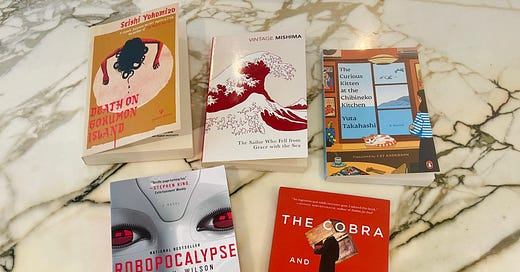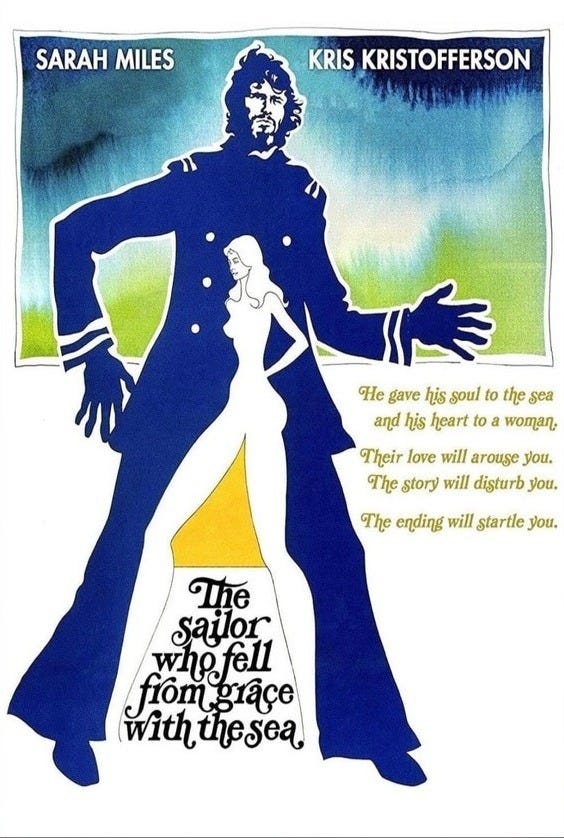Spring Break, sure, but have you tried Reading Week?
We have the Canadians to thank for this.
Despite what the news would have you believe, tourists are still traveling between the US and Canada. The Fort Lauderdale Airport Terminal 3 where I’m sitting seems to only serve Canada. Every gate is a flight to Toronto, Montreal, Quebec City, Ottawa, or Sudbury, and the terminal is slammed. Six different airlines—Delta, Air Canada, West Jet, AirTransat, Porter, and Flair—fly daily between Fort Lauderdale where I live, and Canada, and as I look around the airport, most of the passengers are sunburnt. Clusters of young, hunky mustached Quebecois French-speaking men in tank tops, board shorts, and Birkenstocks fly from Montreal to Fort Lauderdale every 30 minutes. This makes sense given that Fort Lauderdale is the birthplace of Spring Break, and after the long, brutal winter of this year in particular, many from the great north still venture to America seeking sunshine. Not me though, I’m arctic bound, seeking something else, something very Canadian: Reading Week.
According to Time magazine, spring break began in Fort Lauderdale, Florida in the 1930s. With the city’s new Olympic-size swimming pool—the first one in Florida—a spring college swim forum began were swim teams gathered at this Fort Lauderdale pool yearly, and eventually the gathering became equated with partying and inspired the 1960 coming-of-age film Where the Boys Are. MTV Spring Break in the 1990s and early 2000s further cemented the tradition.
What is Reading Week?
Unlike American Spring Break, Reading Week in Canada takes place in the colder, darker part of winter, in February, and sometimes in the fall too. It originated in British Universities, but in Canada, Reading Week is a week off in the winter university term, coinciding with the Canadian holiday—Family Day (because Canada loves long weekends). It’s a time designed for Canadian students to catch up on academic readings and to begin their term paper research.
I first learned of Reading Week when I was in grad school in Toronto, and as a longtime reading and book lover, I was like, WHAT? WE’RE GOING TO ALL READ FOR A WEEK?? AMAZING!
Since then, I’ve kept this practice, and I long for it periodically; I use it as a reward for hard work or a difficult time life period, because I enjoy it so much. At least once a year, I try to do as little as possible for seven days besides reading books. This could mean reading all day, like on a chill beach vacation. (I managed this once in Manasota Key and it was magical.) Or it could mean reading for a few extra hours in the evening instead of watching TV or scrolling TikTok. Regardless of the time available, when I make the effort, I end up at least doubling my usual reading hours. I also try to mix in physical activity so I’m not a total loaf.
My Reading Week This Week
For example, this week, I’ve been taking my daughter around and doing fun things for her Spring Break, like trying black sesame injeolmi bingsu for the first time, as well as sprucing up and fixing problems in my Airbnb in Toronto, but in between activities, labor, and when my feet need a break from carrying things up and down our three flights of steps, as well as in the evenings, since my partner isn’t with me, I’m on Reading Week.
To commence, I went to Toronto’s famous Annex BMV bookstore, which sells new and used books, is massive, and stays open till 11 pm. There, I loaded up on discounted novels I wanted to read this week. I picked slim manuscripts so I could read more of them, as my favorite books are the ones that take approximately the time a long movie or a mini-series would take to watch—bingeable books.
This is what I grabbed:
I wanted to go to Japan with my family a few months ago for the holidays, but couldn’t due to multiple family members having medical issues, and now I’ve been watching two friends roam through the county via their IG stories, so a bit jealous, I decided to visit Japan via novels. Plus, a Canadian literary fiction writing craft satire that looked very meta, The Cobra and the Key, and a technothriller blurbed by Stephen King, Robopocalypse, which was written by a robitics Phd from Carnegie Mellon.
So far, I’ve finished Death on Gokumon Island and The Sailor Who Feel from Grace with the Sea, by Yukio Mishima, and now I’m reading The Curious Kitten at the Chibineko Kitchen by Yuta Takahashi. Chibineko means “little cat.”
The Sailor Who Fell from Grace with the Sea
The Mishima novel, The Sailor Who Fell from Grace with the Sea, was astounding, and no wonder, the author, I learned, lived a wild and unusual life, born into a samurai family; he became very political and wrote many masterpieces, before, at the young age of 45, committing ritual seppuku and dramatically disemboweling himself with his samurai sword.
I probably would have read this novel last, had I known its power, because it’s a hard act to follow. The writing is something literary lovers must read and I’m sure it would be taught in schools if it weren’t so insane and sexual. The back cover has the Times describing it as “A major work of art,” and that is accurate. There were shades of Lord of the Flies, but it was better, smarter, and hotter. It also captured the anger running sometimes through adolescence so well, and the seductive nature of tropical travel and the ocean.
Here is one passage, spoken by the villain in the book, told to his gang of miscreants, to give you a taste, from the POV of a 13-year-old boy angry at the whole world.
“There is no such thing as a good father because the role itself is bad. Strict fathers, soft fathers, nice moderate fathers—one’s as bad as another. They stand in the way of our progress while they try to burden us with their inferiority complexes, and their unrealized aspirations, and their resentments, and their ideals, and the weaknesses they’ve never told anyone about, and their sins, and their sweeter-than-honey dreams, and the maxims they’ve never had the courage to live by—they’d like to unload all that silly crap on us, all of it! Even the most neglectful fathers, like mine, are no different. Their consciences hurt them because they’ve never paid any attention to their children and they want the kids to understand just how bad the pain is—to sympathize!”
I could have highlighted almost every paragraph in the book. It was so dense, eloquent, and deep. It had me staying up late to finish it.
There is also a film adaptation which I plan to watch, featuring this creative movie poster. They don’t make movie posters like this anymore.
Death on Gokumon Island
The murder mystery novel, Death on Gokumon Island, was also a solid book, and part of a 77 book series! 77 books! I can’t imagine writing that many books with the same character, but this author, Seishi Yokomizo, did it!
The mystery revolved around cryptic Haiku’s and this is one I liked from the book:
“Summer grass—no trace of mighty soldiers’ dreams.”
Written in 1947-1948 and first published in a serial form, the novel was profoundly anti-war. Here is another passage that resonated with me:
“Just like every other young man in Japan, he was drafted by the army and forced to join the war. The best years of his life became a kind of void… On this particular front line, if someone died, no replacement came: they just became short one man. As they fell, one after the other, the few who were left were stricken with despair. Their uniforms and boots were tattered and worn; they sat around like a bunch of helpless statues.”
As I read the novel, I found myself thinking about the current war between Russia and Ukraine with a heavy heart and pondering how it has likely robbed many of a normal youth, turning the lives of young soldiers in their early twenties into the same void Seishi Yokomizo wrote about decades ago.
The Mental Benefits of Reading Week
Feeling the empathy that comes from reading novels is one of the many benefits of Reading Week. Other benefits are relaxing, learning, practicing focusing, and gaining general insights and wisdom. Reading fiction can also improve individuals’ social-cognitive abilities.1 It strengthens working memory and episodic memory.2 Reading reduces the risk of developing Alzheimer’s and dementia.3 Finally, in one study, book readers were shown to experience a 20% reduction in risk of all-cause mortality for the 12 years the study covered, compared to those who don’t read or who only read short articles and magazines.4
Sounds good to me. Find a stack of books and a fireplace or a beach, and dig in.
Instead of a writing retreat, which can feel like work for an author, it’s permission to take a reading retreat—pure pleasure! Put the treat in retreat!
Your Own Reading Week
My recommendation, if you decide to do your own Reading Week, is to pick the books in advance, decide the order you’ll read them, and then work through your stack. Reduce the decision making during the week so you don’t get bogged down on deciding what to read. You can use the Kindle app or Audible to estimate how long books will take to read without buying them if you want to plan your schedule accurately. My preference is also novels because they’re more relaxing for me than reading non-fiction, and physical books because less screentime is also ideal for sleep and serenity.
If you need help with managing to focus more and read longer, see this post:
Pick up a book you TikTok addicts! (Myself included)
With TikTok currently banned/not banned/under threat, with movements to “Deactivate, Delete, and Defund Meta,” and with X under leadership you may despise, there has never been a better time to turn off your phone and read a book.
Now You
Would you do Reading Week? Have you done it before?
What book have you been wanting to read, but haven’t yet?
What’s the best book you’ve read recently?
Have you heard or or read Mishima?
P.S. I’ve been listening to this album a lot while I read and I really love it. Maybe you will love it too:
https://pmc.ncbi.nlm.nih.gov/articles/PMC4733342/
https://www.frontiersin.org/journals/psychology/articles/10.3389/fpsyg.2022.923795/full
https://www.pnas.org/doi/full/10.1073/pnas.061002998=
https://academic.oup.com/innovateage/article/1/suppl_1/477/3898580?login=false







As a Canadian I can tell you that I didn't pick up one book during Reading Week. : ) Yes, in theory we are to use this time to 'catch up' on our studies but it really is a time to go back home and re-connect with your high schools buds, see Family and do nothing and let your family dote on your because their scholar hath returned. They're just stoked to see you so you take full advantage of the laundry, the meals and the sleep ins. Then you meet up at the bar and party and then repeat. OR- you had down south: we all avoided places like Florida but instead would go to all inclusives or drive to Myrtle Beach cuz why not? But yes, I appreciate you took the literal meaning of Reading Week! And of course for many they do use it for serious studying. Just not anyone I knew!
My oldest and I are reading a novel together during Spring Break—and it was their idea! 😄